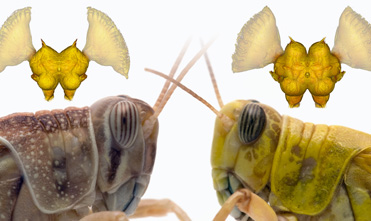Submitted by Administrator on Wed, 07/08/2013 - 16:51
Desert locusts are infamous for their swarming behaviour when they migrate en masse and consume everything in their path, but usually they occur in a form that actively avoids other locusts and live solitary existences. Which one of these lifestyles poses bigger challenges and requires more brain power?
 We found that swarming locusts develop 30% bigger brains compared to those who live in solitude, with selective enlargements in specific regions particularly associated with learning and complex processing. These bigger and profoundly different brains may help them to survive in the cut-throat environment of a locust swarm.
We found that swarming locusts develop 30% bigger brains compared to those who live in solitude, with selective enlargements in specific regions particularly associated with learning and complex processing. These bigger and profoundly different brains may help them to survive in the cut-throat environment of a locust swarm.
Further coverage can be found on the BBC website: http://news.bbc.co.uk/1/hi/science_and_environment/10158856.stm
The research is published in the Proceedings of the Royal Society B
